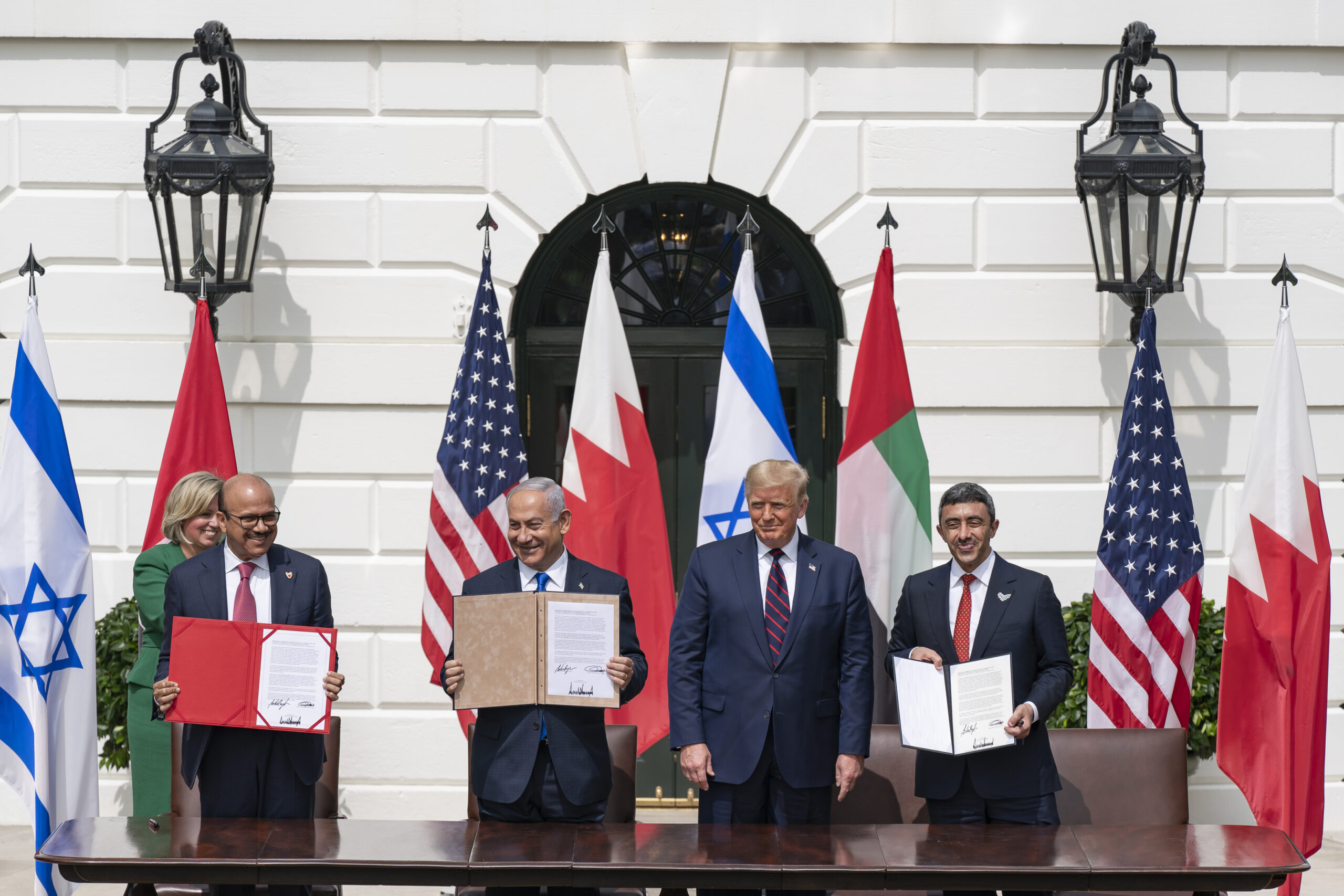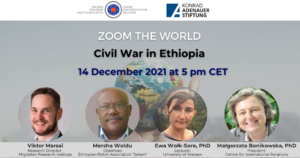
The Abraham Accords were concluded on September 15, 2020 between the United Arab Emirates, Bahrain and Israel. Embassies were opened, unrestricted trade, direct flights and tourist exchange began. However, the purpose of those agreements was not just to initiate a new chapter in difficult mutual relations, but above all building new security architecture in the troubled Middle East. For President Donald Trump’s US diplomatic team – which contributed decisively to the Israeli-Arab rapprochement – the deal was to become a foundation for lasting peace and stabilization, and a way to stop Iran’s expansion in the region. After a year and with a new administration in Washington, these hopes have only partially come true.
Less America – more Russia and China
The key process that is currently taking place in the Middle East is scaling down of US military and political involvement. This is clearly seen in Syria as well as in Iraq and Afghanistan. Such a policy has been pursued by subsequent American administrations – Barack Obama, Donald Trump and now Joe Biden. It is related to the migration of Washington’s strategic interests towards the Indo-Pacific as a consequence of the shift of the global center to East and South Asia in connection with the dynamic growth of China’s economic, political and military power.
The second important aspect of that phenomenon is a global energy transformation: the role of crude oil and other fossil fuels, and thus of the Middle East, is diminishing. However, this does not mean the complete absence of the United States, which still has military bases in Qatar, Bahrain or Saudi Arabia and pursues a multi-dimensional policy in the region. Among the critical issues for the US is Israel’s security and preventing Iran from obtaining nuclear weapons, so the Americans are keeping nearby adequate military forces and infrastructure for a possible rapid response.
One of the consequences of the ongoing scaling down of the US involvement in the Middle East is a more intense Russian presence which is clearly visible since Moscow’s intervention in Syria in September 2015. Despite the fact that Kremlin’s successes have been possible mainly due to the space created by the Americans rather than coming from its real power, Russia now controls parts of the Mediterranean which has a direct impact on the situation of the European Union.
This does not mean, however, that Moscow can replace Washington. Arab countries are cooperating with Russia because of the will to strategically diversify, including diversifying the supply of military technology. At the same time, however, they are not trying to limit their partnership with the US which is still seen as the number 1 player.
Abraham Accords
Since the so-called Arab Spring (2011), the Arab countries of North Africa and the Middle East are undergoing a political, economic and social transformation. In part, it is also a result of generational changes, a technological revolution, and the exponential growth of social networks. A similar process is underway in Sudan and Iraq. Societies call for changes in the ossified political and social system, and face a fierce response from the military and civilian establishment
Simultaneously, there is a shift visible in foreign policy of the Middle Eastern countries, caused by the withdrawal of the US and the need to build new security architecture in the region. One of the most important factors of change is the rapprochement between the regional powers embroiled in an “eternal conflict”: Saudi Arabia in alliance with the United Arab Emirates and smaller Gulf States, and Israel. That new alliance perceives the Islamic Republic of Iran as its main adversary which is backed by Qatar and Turkey. The reversal of alliances, expressed in the form of an international agreement (the so-called Abraham Accords) not only means a formal recognition of Israel by the main regional capitals but clearly divides the Muslim world into two rival camps.
The Abraham Accords were the culmination of efforts by the administration of US President Donald Trump to normalize relations between Tel Aviv and Arab nations, in particular the Persian Gulf States with which Washington maintains special strategic ties. This reconciliation was only a prologue to a kind of domino effect, as at the same time talks were underway with the new government in Sudan and with the Kingdom of Morocco.
In the case of Morocco, the country has been mired in the Western Sahara conflict for decades, with that territory being taken over by force and administered for over 40 years by Rabat. The leaders of the Polisario Front found refuge on the other side of the border. The Polisario has been fighting for the independence of that territory and considers itself the government of the Islamic Republic of the Sahara. Formally, that entity has been recognized as a State by some countries in the world including the African Union which is a very contentious issue for the Moroccan diplomacy. The controversial US decision to recognize Rabat’s rights to that territory resulted in an Israeli foreign minister’s visit to the country – first since 2003. Several decades of non-recognition of Israel, only behind-the-scenes negotiations, lack of trade and technology, were not beneficial to either side.
Seeking a compromise
In that context, it is worth noting that on August 28 Baghdad was hosting a conference on cooperation and partnership which saw – apart from the host country – the participation of the most important regional players: Iran, Saudi Arabia, United Arab Emirates, Kuwait, Qatar, Jordan, Egypt, Turkey, and also France. The meeting, unprecedented in terms of the list of participants, had focused on security issues, the reconstruction of Iraq after decades of wars, foreign investments in the country, climate change, as well as the problems of political and economic partnership, and, most importantly, on a constructive dialogue in the region.
The conference in Baghdad may be interpreted as an attempt to normalise relations between the opposing nations in the region. However, still there are obstacles to a permanent and real rapprochement that are difficult to eliminate, among them fundamental contradictions of strategic interests and a traditional competition for political influence. Iran is not to be expected to relinquish its support for Shi’ite communities in the Sunni-majority Gulf countries. On the other hand, Saudi Arabia will try to gain more influence in Iraq, and in the longer term also in Syria – which is against the interests of Iran and Turkey. Moreover, for security reasons, both the Saudis and the Emirati government will actively support the fight against the Shi’ite (Zaidi faction) Houthi rebels, even without any active support of the American administration.
The Gulf’s Arab nations are fully aware of the economic, strategic and developmental benefits that can bring them a normalization of relations with Israel. The dynamism of economic, tourist and military cooperation shows the importance of the reconciliation with Israel and its significance for the entire region. Israeli-Arab cooperation is also essential in view of the progress Iran has made in nuclear technology, which is what everyone is afraid of.
Israel, because of its security, regularly takes action in neighboring Syria against the expansion of the Iranian presence in those areas. It also tries to limit Tehran’s influence in the so-called “Shi’ite crescent” from Iraq to Syria to Yemen. On the other hand, however, the evident anti-Iranian nature of the Abraham Accords may prove dangerous for the region because it mobilizes Tehran’s allies such as Turkey and Russia. An additional challenge may be the provision of advanced technologies by Israel to Arab authoritarian regimes that enable better surveillance of terrorist groups but also greater control over societies which can be used to strengthen the anti-democratic systems in the region.
Lesser importance of the Palestinian question
The Palestinian question is no longer as critical in the Arab world as it had been before the conclusion of the Abraham Accords. The Arab countries no longer make the issue of the Palestinian statehood a precondition for talks with Israel. It is remarkable that representatives of the Palestinian Authority were not included in the Israeli-Arab talks, and neither were Jordan and Egypt. That absence speaks volumes about the position of Israel and the Palestinians in the international arena. However, it may create a false impression among Israeli politicians that the issue of Palestinian statehood is over. It is the more so as Donald Trump administration moved the US embassy to Jerusalem, thus recognizing it as the capital of Israel.
However, the international community, the UN, as well as the European Union, invariably take the position that the only solution for a lasting peace in the Middle East is the existence of two states: Israel and Palestine. There is no real alternative in this respect that could be acceptable to all the countries concerned. The question is whether such a position needs to be redefined, especially in the context of a dysfunction of the Palestinian Autonomy.
The current political structure and the internal situation of the Palestinian Authority prevent it from functioning effectively. In practice, there is no unitary authority and no common political center covering both the West Bank where the Fatah governs, and the Hamas-controlled Gaza Strip[1]. The matter is further complicated by Jewish settlements in the West Bank. Freezing of their construction had not been resolved unequivocally by the famous Camp David accords in 1978[2]. It is impossible to predict whether that unfavorable situation will change in the long term. The current ruling coalition in Israel is too diverse to take a decisive action to normalize political relations with the Palestinians. Instead, it focuses on the economic strengthening of the Palestinian Territories. This is in line with the attitude of the public, which currently shows little interest in dialogue with the Palestinians. The Israeli government’s priority is foreign policy, in particular Iran’s actions, the situation in Syria as well as the strong position of Hezbollah[3] in Lebanon.
The article was based, among others, on the “Middle East one year after Abraham accords” debate, which took place on November 23, 2021 as part of the “4 TAKES on the Middle EAST” series, organised by ELNET-Poland and Centre for International Relations.
Author: Bruno Surdel, PhD, analyst, Centre for International Relations
[1] Fatah – a left-wing Palestinian political and military movement established in 1959, ruling the West Bank, the dominant force in the Palestinian Liberation Organization (PLO). Its leader was Jasser Arafat until his death in 2004. Since 1988, Fatah has accepted the coexistence of a Palestinian state and Israel with sharing Jerusalem as the capital of both nations. The current leader of Fatah is the president of the Palestinian Authority, Mahmoud Abbas.
Hamas – a radical Palestinian movement that has controlled the Gaza Strip since 2007, recognized by Israel, the US and the EU as a terrorist organization. It was founded in 1987 by Sheikh Ahmed Yassin and, unlike Fatah, it has a decidedly Islamist character, ideologically connected with the Muslim Brotherhood. Its leader is Ismail Haniyeh.
[2] The Camp David Accords between Egypt and Israel were signed on September 17, 1978, after difficult two-week negotiations, mediated by US President Jimmy Carter. They made it possible to conclude peace between the two countries in the following year, setting a serious, constructive precedent in Israeli-Arab relations. The issue of freezing the construction of Jewish settlements in the West Bank was not included directly in the text of the agreements, but in a public letter from the Israeli Prime Minister Menachem Begin to President Carter agreed with Washington. Its wording is ambiguous and interpretation has been since controversial. On the issue of the Palestinian-Israeli conflict and attempts to resolve it, see: Jerzy Wójcik: Camp David conference and its aftermath: the Israeli-Palestinian peace process after 2000; Israel-Poland-Europe Forum, Krakow 2013.
[3] Hezbollah – a political, military and social movement in Lebanon, founded in 1982 and supported by Iran. Hezbollah’s leader is Hasan Nasrallah, and the movement itself plays a major political role in Lebanon. Hezbollah has been operating against Israel since its inception, and in 2006 the conflict culminated in a 34-day war. This organization actively supports the Bashar Assad regime in Syria by sending its fighters there to fight the rebels. Hezbollah is considered a terrorist movement by the US, UK, Australia, Canada and Israel (among others). The European Union considers only the military division of Hezbollah to be terrorist.
[evc_interactive_banner type=”classic” custom_link=”url:https%3A%2F%2Fmastersandrobots.tech%2F|||”]




